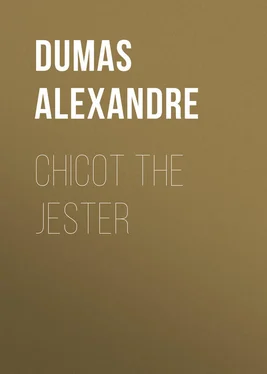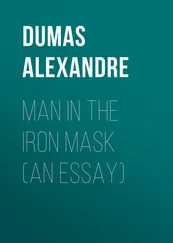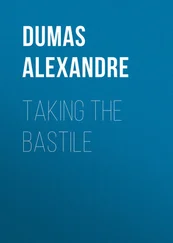Alexandre Dumas - Chicot the Jester
Здесь есть возможность читать онлайн «Alexandre Dumas - Chicot the Jester» — ознакомительный отрывок электронной книги совершенно бесплатно, а после прочтения отрывка купить полную версию. В некоторых случаях можно слушать аудио, скачать через торрент в формате fb2 и присутствует краткое содержание. Жанр: literature_19, foreign_antique, foreign_prose, на английском языке. Описание произведения, (предисловие) а так же отзывы посетителей доступны на портале библиотеки ЛибКат.
- Название:Chicot the Jester
- Автор:
- Жанр:
- Год:неизвестен
- ISBN:нет данных
- Рейтинг книги:5 / 5. Голосов: 1
-
Избранное:Добавить в избранное
- Отзывы:
-
Ваша оценка:
- 100
- 1
- 2
- 3
- 4
- 5
Chicot the Jester: краткое содержание, описание и аннотация
Предлагаем к чтению аннотацию, описание, краткое содержание или предисловие (зависит от того, что написал сам автор книги «Chicot the Jester»). Если вы не нашли необходимую информацию о книге — напишите в комментариях, мы постараемся отыскать её.
Chicot the Jester — читать онлайн ознакомительный отрывок
Ниже представлен текст книги, разбитый по страницам. Система сохранения места последней прочитанной страницы, позволяет с удобством читать онлайн бесплатно книгу «Chicot the Jester», без необходимости каждый раз заново искать на чём Вы остановились. Поставьте закладку, и сможете в любой момент перейти на страницу, на которой закончили чтение.
Интервал:
Закладка:
He was a man about thirty-five, tall, marked by the smallpox, and with a disagreeable expression. Dressed in a jacket of green cloth braided with silver, with a silver shoulder belt, on which the king’s arms were embroidered in gold; on his head a cap with a long plume; in his left hand a spear, and in his right the éstortuaire [Footnote: The éstortuaire was a stick, which the chief huntsman presented to the king, to put aside the branches of the trees when he was going at full gallop.] destined for the king, M. de Monsoreau might look like a terrible warrior, but not certainly like a handsome cavalier.
“Fie! what an ugly figure you have brought us, monseigneur,” said Bussy, to the Duc d’Anjou, “are these the sort of gentlemen that your favor seeks for out of the provinces? Certainly, one could hardly find such in Paris, which is nevertheless as well stocked with ugliness. They say that your highness made a great point of the king’s appointing this man.”
“M. de Monsoreau has served me well, and I recompense him,” replied the duke.
“Well said, monseigneur, it is rare for princes to be grateful; but if that be all, I also have served you well, and should wear the embroidered jacket more gracefully, I trust, than M. de Monsoreau. He has a red beard, I see also, which is an additional beauty.”
“I never knew that a man must be an Apollo, or Antinous, to fill an office at court.”
“You never heard it; astonishing!”
“I consult the heart and not the face – the services rendered and promised.”
“Your highness will say I am very envious; but I search, and uselessly, I confess, to discover what service this Monsoreau can have rendered you.”
“You are too curious, Bussy,” said the duke, angrily.
“Just like princes,” cried Bussy, with his ordinary freedom, “they ask you everything; but if you ask a question in return, you are too curious.”
“Well! go and ask M. de Monsoreau, himself.”
“Ah! you are right. He is but a simple gentleman, and if he do not reply, I shall know what to say.”
“What?”
“Tell him he is impertinent.” And, turning from the prince, Bussy approached M. de Monsoreau, who was in the midst of the circle.
Bussy approached, gay and smiling, and his hat in his hand.
“Pardon, monsieur, but you seem all alone. Is it that the favor which you enjoy has already made you enemies?”
“I do not know, monsieur, but it is probable. But, may I ask, to what I owe the honor that you do me in invading my solitude?”
“Ma foi, to the great admiration that M. le Duc d’Anjou has inspired in me for you.”
“How so?”
“By recounting to me the exploit for which you were made chief huntsman.”
M. de Monsoreau grew so frightfully pale, that the marks in his face looked like black spots on his yellow skin; at the same time he looked at Bussy in a manner that portended a violent storm. Bussy saw that he had done wrong; but he was not a man to draw back; on the contrary, he was one of those who generally repair an indiscretion by an impertinence.
“You say, monsieur,” said Monsoreau, “that the Duke recounted to you my last exploit?”
“Yes, monsieur, but I should much like to hear the story from your own lips.”
M. de Monsoreau clasped his dagger tighter in his hand, as though he longed to attack Bussy.
“Ma foi, monsieur,” said he, “I was quite disposed to grant your request, and recognize your courtesy, but unfortunately here is the king arriving, so we must leave it for another time.”
Indeed, the king, mounted on his favorite Spanish horse, advanced rapidly towards them. He loved handsome faces, and was therefore little pleased with that of M. de Monsoreau. However, he accepted, with a good grace, the éstortuaire which he presented to him, kneeling, according to custom. As soon as the king was armed, the chase commenced.
Bussy watched narrowly everyone that passed, looking for the original of the portrait, but in vain; there were pretty, even beautiful and charming women, but not the charming creature whom he sought for. He was reduced to conversation, and the company of his ordinary friends. Antragues, always laughing and talking, was a great amusement.
“We have a frightful chief huntsman,” said he to Bussy, “do you not think so?”
“I find him horrible; what a family it must be if his children are like him. Do you know his wife?”
“He is not married.”
“How do you know?”
“From Madame de Vendron, who finds him very handsome, and would willingly make him her fourth husband. See how she keeps near him.”
“What property has he?”
“Oh! a great deal in Anjou.”
“Then he is rich?”
“They say so, but that is all; he is not of very good birth. But see, there is M. le Duc d’Anjou calling to you.”
“Ah! ma foi, he must wait. I am curious about this man. I find him singular, I hardly know why. And such an odd name.”
“Oh! it comes from Mons Soricis; Livarot knows all about that. – Here, Livarot; this Monsoreau – ”
“Well.”
“Tell us what you know about him – ”
“Willingly. Firstly, I am afraid of him.”
“Good, that is what you think; now tell us what you know.”
“Listen. I was going home one night – ”
“It begins in a terrible manner.”
“Pray let me finish. It was about six months ago, I was returning from my uncle D’Entragues, through the wood of Méridor, when all at once I heard a frightful cry, and I saw pass, with an empty saddle, a white horse, rushing through the wood. I rode on, and at the end of a long avenue, darkened by the approaching shades of night, I saw a man on a black horse; he seemed to fly. Then I heard again the same cry, and I distinguished before him on the saddle a woman, on whose mouth he had his hand. I had a gun in my hand – you know I aim well, and I should have killed him, but my gun missed fire.”
“Well?”
“I asked a woodcutter who this gentleman on the black horse was, and he said, ‘M. de Monsoreau.’”
“Well,” said Antragues, “it is not so uncommon to carry away a woman, is it, Bussy?”
“No; but, at least, one might let them cry out.”
“And who was the woman?”
“That I do not know; but he has a bad reputation,”
“Do you know anything else about him?”
“No; but he is much feared by his tenantry. However, he is a good hunter, and will fill his post better than St. Luc would have done, for whom it was first destined.”
“Do you know where St. Luc is?”
“No; is he still the king’s prisoner?”
“Not at all; he set off at one o’clock this morning to visit his country house with his wife.”
“Banished?”
“It looks like it.”
“Impossible!”
“True as the gospel; Marshal de Brissac told me so this morning.”
“Well! it has served M. de Monsoreau – ”
“Ah! I know now.”
“Know what?”
“The service that he rendered to the duke.”
“Who? St. Luc?”
“No; Monsoreau.”
“Really.”
“Yes, you shall see; come with me,” and Bussy, followed by Livarot and Antragues, galloped after the Duc d’Anjou.
“Ah, monseigneur,” said he, “what a precious man M. de Monsoreau is.”
“Ah! really; then you spoke to him?”
“Certainly.”
“And asked him what he had done for me?”
“Certainly; that was all I spoke to him for.”
“And what did he say?”
“He courteously confessed that he was your purveyor.”
“Of game?”
“No; of women.”
“What do you mean, Bussy?” cried the duke angrily.
“I mean, monseigneur, that he carries away women for you on his great black horse, and that as they are ignorant of the honor reserved for them, he puts his hand on their mouths to prevent their crying out.”
Читать дальшеИнтервал:
Закладка:
Похожие книги на «Chicot the Jester»
Представляем Вашему вниманию похожие книги на «Chicot the Jester» списком для выбора. Мы отобрали схожую по названию и смыслу литературу в надежде предоставить читателям больше вариантов отыскать новые, интересные, ещё непрочитанные произведения.
Обсуждение, отзывы о книге «Chicot the Jester» и просто собственные мнения читателей. Оставьте ваши комментарии, напишите, что Вы думаете о произведении, его смысле или главных героях. Укажите что конкретно понравилось, а что нет, и почему Вы так считаете.












